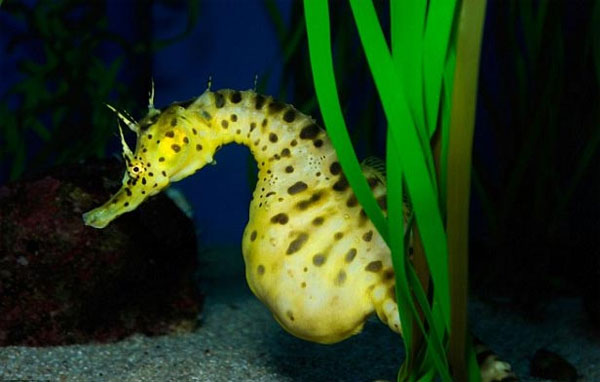Oddly pregnant dads in seahorses
Seahorses are currently the only species in the animal kingdom that has pregnant males. However, the "pregnant fathers" in this species have much more resemblance to the "pregnant mothers" of human beings than their looks.
Pregnancy story of male seahorses
Exactly how large the role of male seahorses is, in nourishing embryos during pregnancy, in the abdominal pouch, lasting 24 days has been a mystery. However, a new study by the University of Sydney (Australia) found that male seahorses hatched and nurtured their offspring nearly similar to pregnant women.
According to Molecular Biology and Evolution magazine, the team led by Dr. Camilla Whittington examined the conditions inside the pregnant bag of male seahorses. They found that, while the young seahorses were not born receiving the majority of the nutrients from the egg yolk provided by their mothers, their fathers evolved to provide more nutrients and protection from the immune system. Translation for his descendants.

Seahorses are the only species that males are pregnant, not females.
Seahorses also provide for mature fetuses the amount of essential oxygen, while eliminating waste like the womb of pregnant women.
Biologists discovered that these animal fathers could bring lipids rich in energy and calcium to developing fetuses, helping them build tiny bones. They said that it is likely that these nutrients are secreted inside the incubator and then absorbed by the fetuses.
In the early stages of pregnancy, the womb of pregnant women also secretes nutrients when the embryo develops. And in the later stages of pregnancy, the fetus acquires nutrients through the umbilical cord.
- Dwarf seahorses catch bait 1/1000 second
- Artificial reproduction of the world's largest seahorses
The team also found that genes expressed in male seahorses during pregnancy are similar to those expressed in humans.
Dr. Whittington said that her findings and her colleagues suggest that the evolutionary sources of pregnancy in different animals have more in common than our previous conjecture.
"Regardless of the species, pregnancy shows a lot of complex challenges, such as ensuring the supply of oxygen and nutrients to the fetus. We have evolved independently," the researcher explained. set up to meet these challenges, but our research implies that even less-related animals use the same genes to control pregnancy and produce healthy descendants. "
- Pregnant male fish - Seahorse
- Why do male seahorses become pregnant and give birth to children that are not females?
- Dwarf seahorses catch bait 1/1000 second
- Video: Close-up of male seahorses laying 2,000 birds at once
- Artificial reproduction of the world's largest seahorses
- Video: Male seahorse buckles and gives birth to hundreds of children
- Male seahorses like mates
- Having children changes the brain of men
- Pregnant woman while pregnant
- Detecting secrets about seahorses sperm
- Male seahorses - natural mothers
- Explain the science behind the pregnant woman's curious appetite
 Surprised: Fish that live in the dark ocean still see colors
Surprised: Fish that live in the dark ocean still see colors Japan suddenly caught the creature that caused the earthquake in the legend
Japan suddenly caught the creature that caused the earthquake in the legend A series of gray whale carcasses washed ashore on California's coast
A series of gray whale carcasses washed ashore on California's coast Compare the size of shark species in the world
Compare the size of shark species in the world Why do male seahorses become pregnant and give birth to children that are not females?
Why do male seahorses become pregnant and give birth to children that are not females?  Dwarf seahorses catch bait 1/1000 second
Dwarf seahorses catch bait 1/1000 second  Artificial reproduction of the world's largest seahorses
Artificial reproduction of the world's largest seahorses  Male seahorses like mates
Male seahorses like mates  Artificial reproduction of rare seahorses
Artificial reproduction of rare seahorses  Detecting secrets about seahorses sperm
Detecting secrets about seahorses sperm 